HA3042 Taxation Law: Analyzing Income, Benefits, and Tax Avoidance
VerifiedAdded on 2023/06/04
|12
|3420
|217
Report
AI Summary
This report delves into various aspects of Australian taxation law through several case studies and scenarios. It addresses whether annual lottery commission payments constitute income, examines the calculation of taxable income for a pharmacy considering the Pharmaceutical Benefits Scheme (PBS), explains the principle applied in the IRC v Duke of Westminster case regarding tax avoidance, and analyzes the allocation of losses and capital gains for tax purposes. The report references relevant legislation such as the Income Tax Assessment Act and the National Health Act, providing a comprehensive overview of the legal and financial implications discussed. Desklib offers a wealth of similar resources for students seeking to enhance their understanding of complex legal and financial topics.
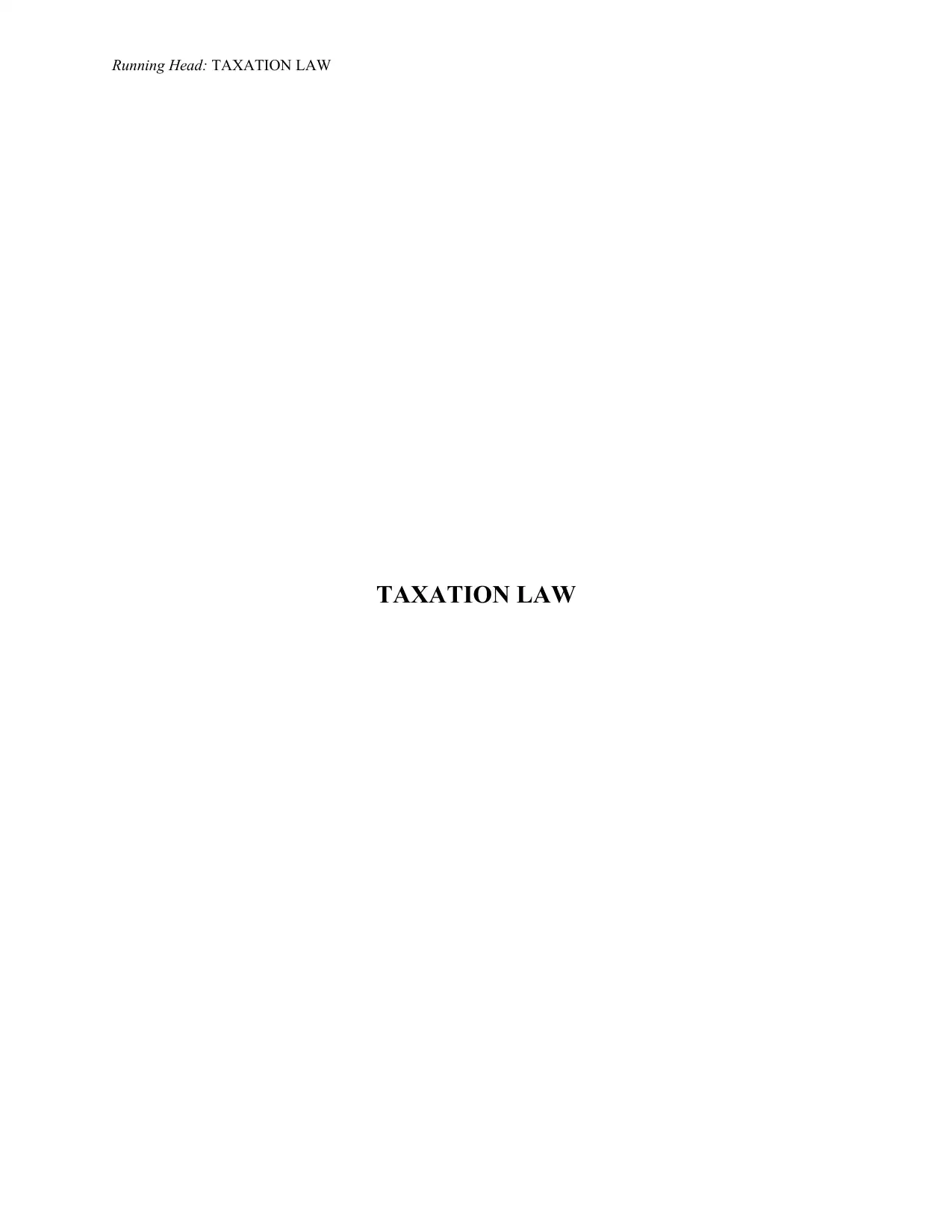
Running Head: TAXATION LAW
TAXATION LAW
TAXATION LAW
Paraphrase This Document
Need a fresh take? Get an instant paraphrase of this document with our AI Paraphraser
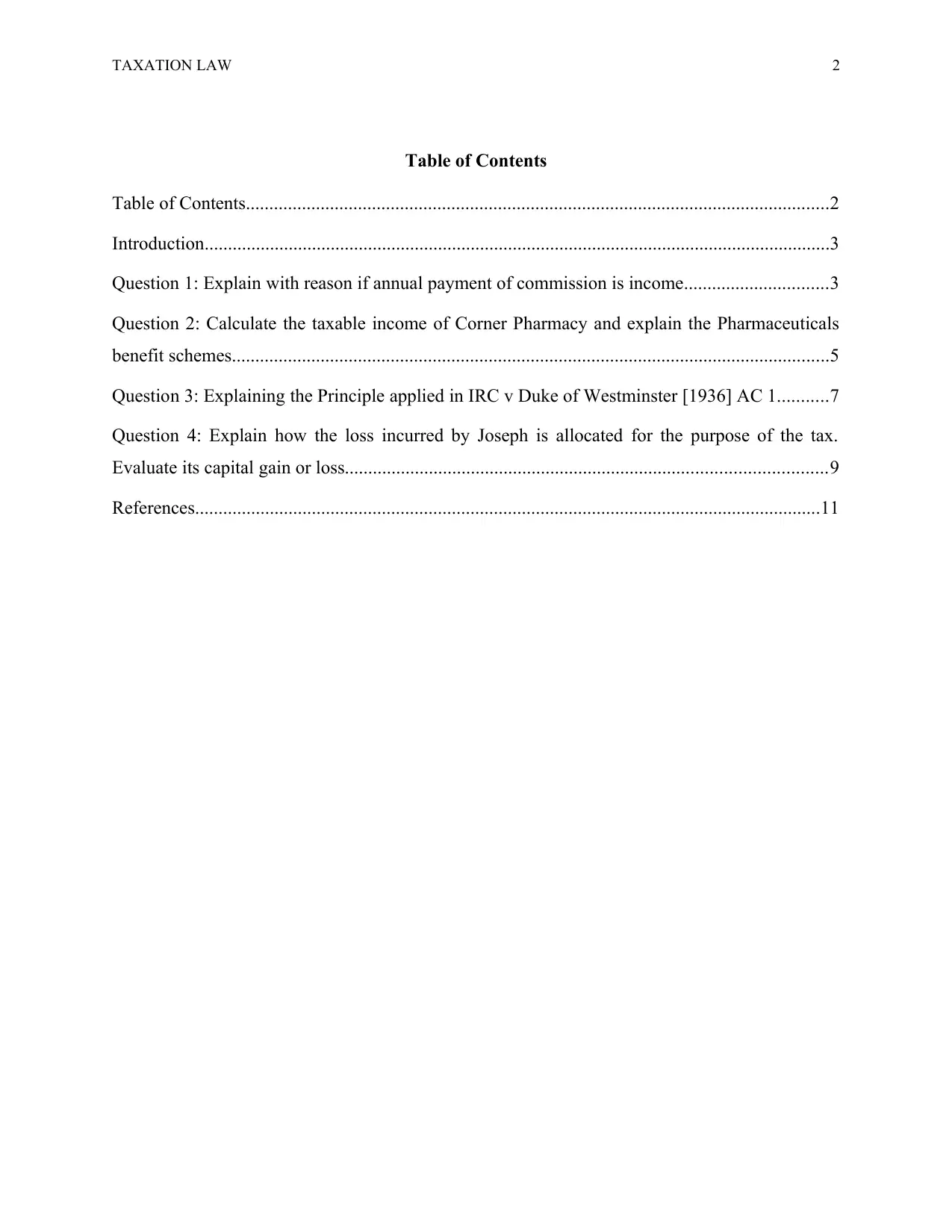
TAXATION LAW 2
Table of Contents
Table of Contents.............................................................................................................................2
Introduction......................................................................................................................................3
Question 1: Explain with reason if annual payment of commission is income...............................3
Question 2: Calculate the taxable income of Corner Pharmacy and explain the Pharmaceuticals
benefit schemes................................................................................................................................5
Question 3: Explaining the Principle applied in IRC v Duke of Westminster [1936] AC 1...........7
Question 4: Explain how the loss incurred by Joseph is allocated for the purpose of the tax.
Evaluate its capital gain or loss.......................................................................................................9
References......................................................................................................................................11
Table of Contents
Table of Contents.............................................................................................................................2
Introduction......................................................................................................................................3
Question 1: Explain with reason if annual payment of commission is income...............................3
Question 2: Calculate the taxable income of Corner Pharmacy and explain the Pharmaceuticals
benefit schemes................................................................................................................................5
Question 3: Explaining the Principle applied in IRC v Duke of Westminster [1936] AC 1...........7
Question 4: Explain how the loss incurred by Joseph is allocated for the purpose of the tax.
Evaluate its capital gain or loss.......................................................................................................9
References......................................................................................................................................11
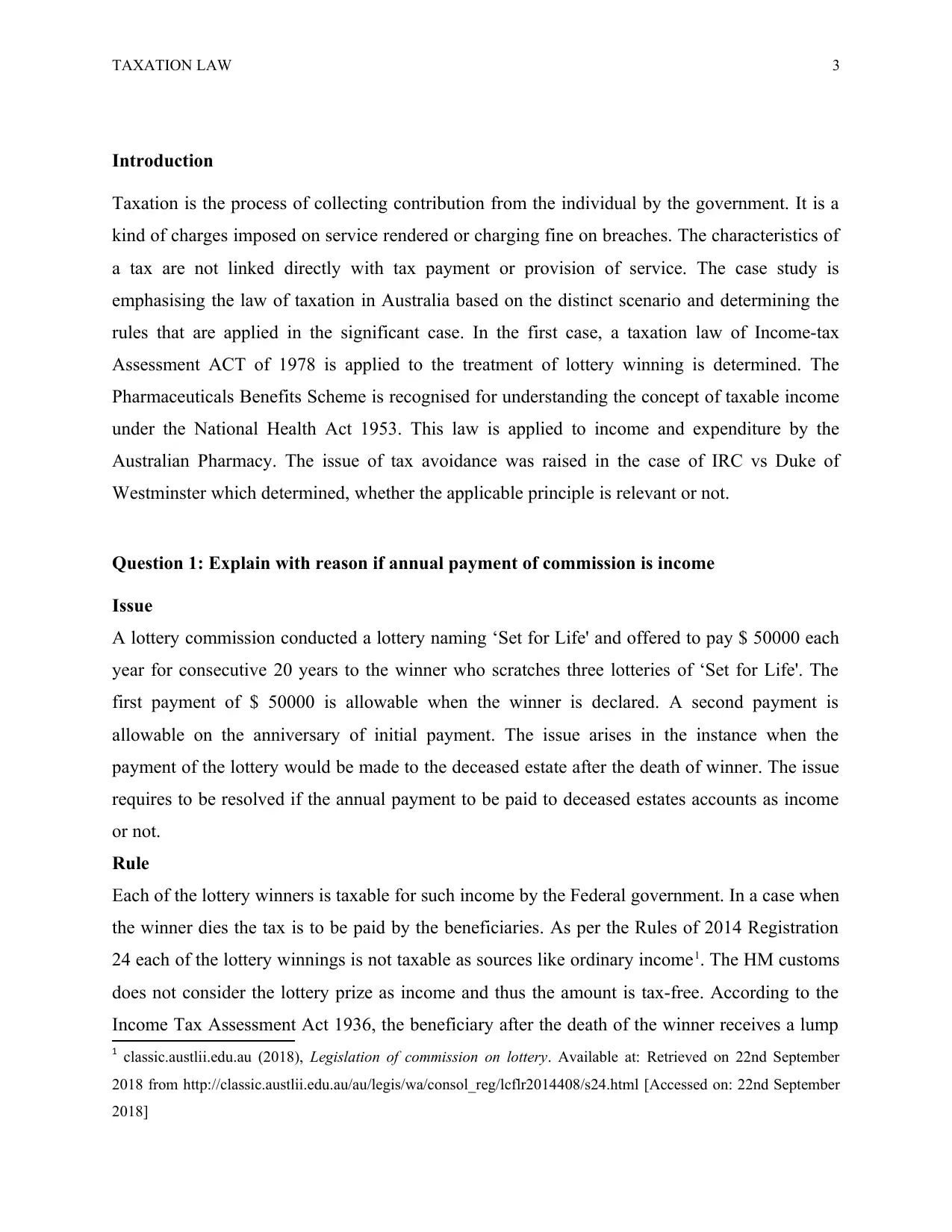
TAXATION LAW 3
Introduction
Taxation is the process of collecting contribution from the individual by the government. It is a
kind of charges imposed on service rendered or charging fine on breaches. The characteristics of
a tax are not linked directly with tax payment or provision of service. The case study is
emphasising the law of taxation in Australia based on the distinct scenario and determining the
rules that are applied in the significant case. In the first case, a taxation law of Income-tax
Assessment ACT of 1978 is applied to the treatment of lottery winning is determined. The
Pharmaceuticals Benefits Scheme is recognised for understanding the concept of taxable income
under the National Health Act 1953. This law is applied to income and expenditure by the
Australian Pharmacy. The issue of tax avoidance was raised in the case of IRC vs Duke of
Westminster which determined, whether the applicable principle is relevant or not.
Question 1: Explain with reason if annual payment of commission is income
Issue
A lottery commission conducted a lottery naming ‘Set for Life' and offered to pay $ 50000 each
year for consecutive 20 years to the winner who scratches three lotteries of ‘Set for Life'. The
first payment of $ 50000 is allowable when the winner is declared. A second payment is
allowable on the anniversary of initial payment. The issue arises in the instance when the
payment of the lottery would be made to the deceased estate after the death of winner. The issue
requires to be resolved if the annual payment to be paid to deceased estates accounts as income
or not.
Rule
Each of the lottery winners is taxable for such income by the Federal government. In a case when
the winner dies the tax is to be paid by the beneficiaries. As per the Rules of 2014 Registration
24 each of the lottery winnings is not taxable as sources like ordinary income1. The HM customs
does not consider the lottery prize as income and thus the amount is tax-free. According to the
Income Tax Assessment Act 1936, the beneficiary after the death of the winner receives a lump
1 classic.austlii.edu.au (2018), Legislation of commission on lottery. Available at: Retrieved on 22nd September
2018 from http://classic.austlii.edu.au/au/legis/wa/consol_reg/lcflr2014408/s24.html [Accessed on: 22nd September
2018]
Introduction
Taxation is the process of collecting contribution from the individual by the government. It is a
kind of charges imposed on service rendered or charging fine on breaches. The characteristics of
a tax are not linked directly with tax payment or provision of service. The case study is
emphasising the law of taxation in Australia based on the distinct scenario and determining the
rules that are applied in the significant case. In the first case, a taxation law of Income-tax
Assessment ACT of 1978 is applied to the treatment of lottery winning is determined. The
Pharmaceuticals Benefits Scheme is recognised for understanding the concept of taxable income
under the National Health Act 1953. This law is applied to income and expenditure by the
Australian Pharmacy. The issue of tax avoidance was raised in the case of IRC vs Duke of
Westminster which determined, whether the applicable principle is relevant or not.
Question 1: Explain with reason if annual payment of commission is income
Issue
A lottery commission conducted a lottery naming ‘Set for Life' and offered to pay $ 50000 each
year for consecutive 20 years to the winner who scratches three lotteries of ‘Set for Life'. The
first payment of $ 50000 is allowable when the winner is declared. A second payment is
allowable on the anniversary of initial payment. The issue arises in the instance when the
payment of the lottery would be made to the deceased estate after the death of winner. The issue
requires to be resolved if the annual payment to be paid to deceased estates accounts as income
or not.
Rule
Each of the lottery winners is taxable for such income by the Federal government. In a case when
the winner dies the tax is to be paid by the beneficiaries. As per the Rules of 2014 Registration
24 each of the lottery winnings is not taxable as sources like ordinary income1. The HM customs
does not consider the lottery prize as income and thus the amount is tax-free. According to the
Income Tax Assessment Act 1936, the beneficiary after the death of the winner receives a lump
1 classic.austlii.edu.au (2018), Legislation of commission on lottery. Available at: Retrieved on 22nd September
2018 from http://classic.austlii.edu.au/au/legis/wa/consol_reg/lcflr2014408/s24.html [Accessed on: 22nd September
2018]
⊘ This is a preview!⊘
Do you want full access?
Subscribe today to unlock all pages.

Trusted by 1+ million students worldwide
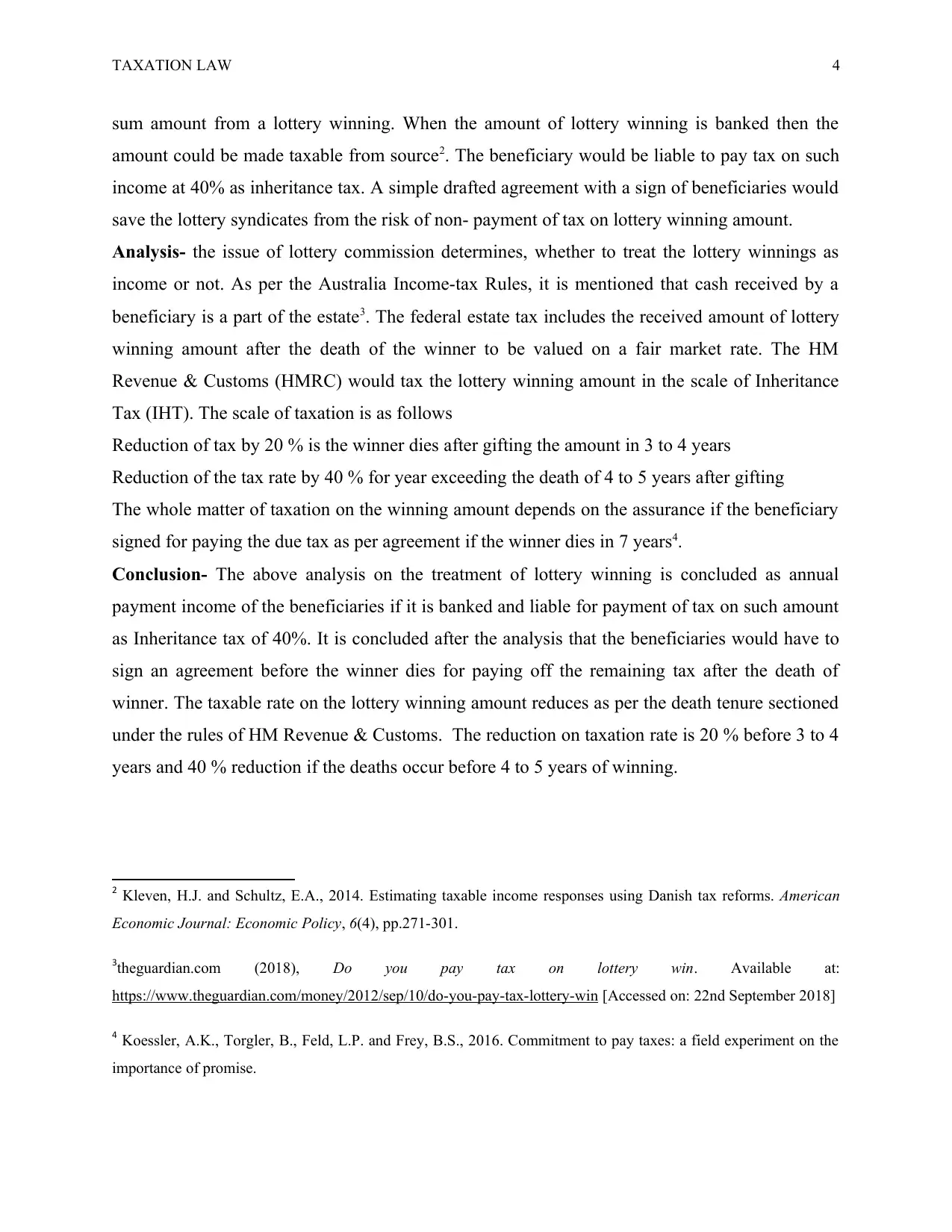
TAXATION LAW 4
sum amount from a lottery winning. When the amount of lottery winning is banked then the
amount could be made taxable from source2. The beneficiary would be liable to pay tax on such
income at 40% as inheritance tax. A simple drafted agreement with a sign of beneficiaries would
save the lottery syndicates from the risk of non- payment of tax on lottery winning amount.
Analysis- the issue of lottery commission determines, whether to treat the lottery winnings as
income or not. As per the Australia Income-tax Rules, it is mentioned that cash received by a
beneficiary is a part of the estate3. The federal estate tax includes the received amount of lottery
winning amount after the death of the winner to be valued on a fair market rate. The HM
Revenue & Customs (HMRC) would tax the lottery winning amount in the scale of Inheritance
Tax (IHT). The scale of taxation is as follows
Reduction of tax by 20 % is the winner dies after gifting the amount in 3 to 4 years
Reduction of the tax rate by 40 % for year exceeding the death of 4 to 5 years after gifting
The whole matter of taxation on the winning amount depends on the assurance if the beneficiary
signed for paying the due tax as per agreement if the winner dies in 7 years4.
Conclusion- The above analysis on the treatment of lottery winning is concluded as annual
payment income of the beneficiaries if it is banked and liable for payment of tax on such amount
as Inheritance tax of 40%. It is concluded after the analysis that the beneficiaries would have to
sign an agreement before the winner dies for paying off the remaining tax after the death of
winner. The taxable rate on the lottery winning amount reduces as per the death tenure sectioned
under the rules of HM Revenue & Customs. The reduction on taxation rate is 20 % before 3 to 4
years and 40 % reduction if the deaths occur before 4 to 5 years of winning.
2 Kleven, H.J. and Schultz, E.A., 2014. Estimating taxable income responses using Danish tax reforms. American
Economic Journal: Economic Policy, 6(4), pp.271-301.
3theguardian.com (2018), Do you pay tax on lottery win. Available at:
https://www.theguardian.com/money/2012/sep/10/do-you-pay-tax-lottery-win [Accessed on: 22nd September 2018]
4 Koessler, A.K., Torgler, B., Feld, L.P. and Frey, B.S., 2016. Commitment to pay taxes: a field experiment on the
importance of promise.
sum amount from a lottery winning. When the amount of lottery winning is banked then the
amount could be made taxable from source2. The beneficiary would be liable to pay tax on such
income at 40% as inheritance tax. A simple drafted agreement with a sign of beneficiaries would
save the lottery syndicates from the risk of non- payment of tax on lottery winning amount.
Analysis- the issue of lottery commission determines, whether to treat the lottery winnings as
income or not. As per the Australia Income-tax Rules, it is mentioned that cash received by a
beneficiary is a part of the estate3. The federal estate tax includes the received amount of lottery
winning amount after the death of the winner to be valued on a fair market rate. The HM
Revenue & Customs (HMRC) would tax the lottery winning amount in the scale of Inheritance
Tax (IHT). The scale of taxation is as follows
Reduction of tax by 20 % is the winner dies after gifting the amount in 3 to 4 years
Reduction of the tax rate by 40 % for year exceeding the death of 4 to 5 years after gifting
The whole matter of taxation on the winning amount depends on the assurance if the beneficiary
signed for paying the due tax as per agreement if the winner dies in 7 years4.
Conclusion- The above analysis on the treatment of lottery winning is concluded as annual
payment income of the beneficiaries if it is banked and liable for payment of tax on such amount
as Inheritance tax of 40%. It is concluded after the analysis that the beneficiaries would have to
sign an agreement before the winner dies for paying off the remaining tax after the death of
winner. The taxable rate on the lottery winning amount reduces as per the death tenure sectioned
under the rules of HM Revenue & Customs. The reduction on taxation rate is 20 % before 3 to 4
years and 40 % reduction if the deaths occur before 4 to 5 years of winning.
2 Kleven, H.J. and Schultz, E.A., 2014. Estimating taxable income responses using Danish tax reforms. American
Economic Journal: Economic Policy, 6(4), pp.271-301.
3theguardian.com (2018), Do you pay tax on lottery win. Available at:
https://www.theguardian.com/money/2012/sep/10/do-you-pay-tax-lottery-win [Accessed on: 22nd September 2018]
4 Koessler, A.K., Torgler, B., Feld, L.P. and Frey, B.S., 2016. Commitment to pay taxes: a field experiment on the
importance of promise.
Paraphrase This Document
Need a fresh take? Get an instant paraphrase of this document with our AI Paraphraser
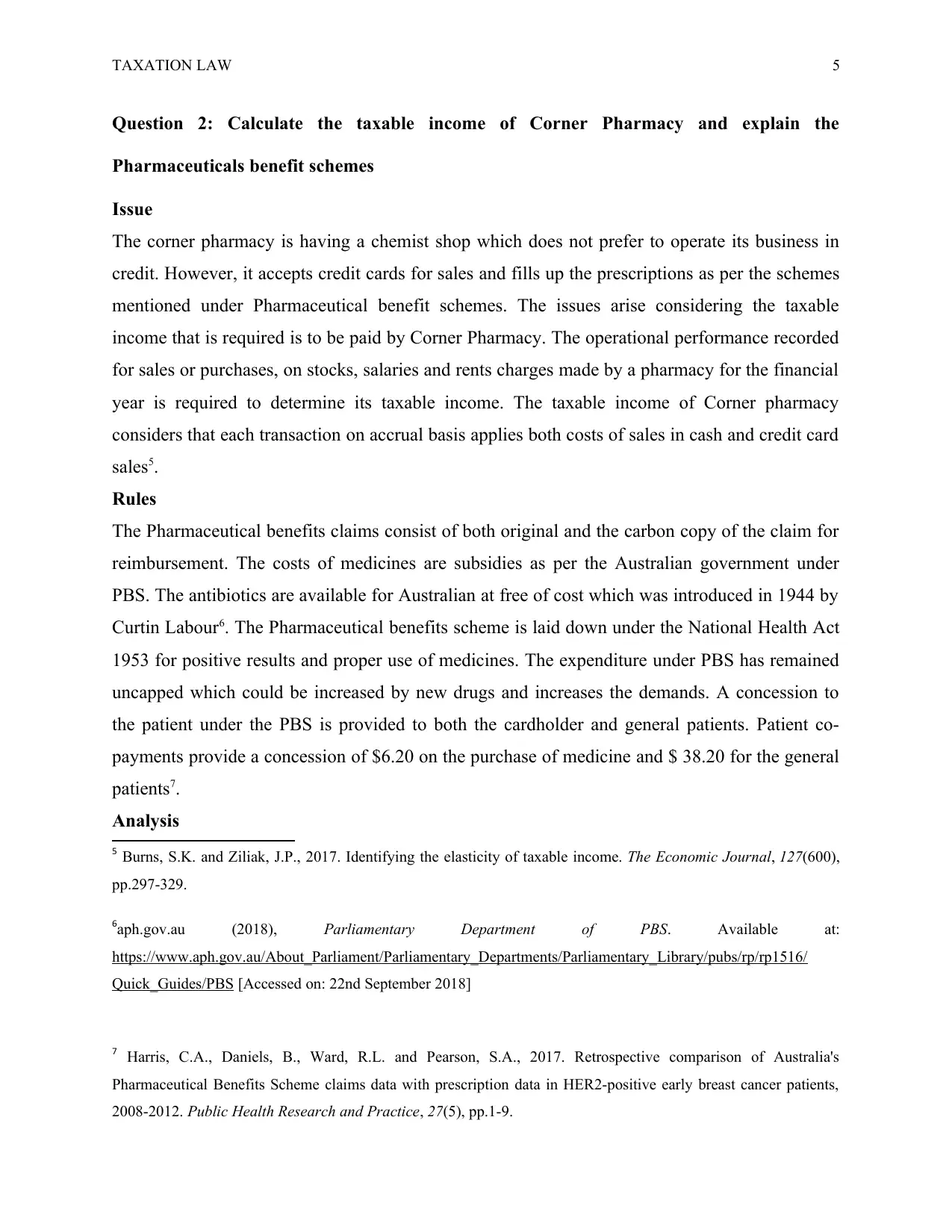
TAXATION LAW 5
Question 2: Calculate the taxable income of Corner Pharmacy and explain the
Pharmaceuticals benefit schemes
Issue
The corner pharmacy is having a chemist shop which does not prefer to operate its business in
credit. However, it accepts credit cards for sales and fills up the prescriptions as per the schemes
mentioned under Pharmaceutical benefit schemes. The issues arise considering the taxable
income that is required is to be paid by Corner Pharmacy. The operational performance recorded
for sales or purchases, on stocks, salaries and rents charges made by a pharmacy for the financial
year is required to determine its taxable income. The taxable income of Corner pharmacy
considers that each transaction on accrual basis applies both costs of sales in cash and credit card
sales5.
Rules
The Pharmaceutical benefits claims consist of both original and the carbon copy of the claim for
reimbursement. The costs of medicines are subsidies as per the Australian government under
PBS. The antibiotics are available for Australian at free of cost which was introduced in 1944 by
Curtin Labour6. The Pharmaceutical benefits scheme is laid down under the National Health Act
1953 for positive results and proper use of medicines. The expenditure under PBS has remained
uncapped which could be increased by new drugs and increases the demands. A concession to
the patient under the PBS is provided to both the cardholder and general patients. Patient co-
payments provide a concession of $6.20 on the purchase of medicine and $ 38.20 for the general
patients7.
Analysis
5 Burns, S.K. and Ziliak, J.P., 2017. Identifying the elasticity of taxable income. The Economic Journal, 127(600),
pp.297-329.
6aph.gov.au (2018), Parliamentary Department of PBS. Available at:
https://www.aph.gov.au/About_Parliament/Parliamentary_Departments/Parliamentary_Library/pubs/rp/rp1516/
Quick_Guides/PBS [Accessed on: 22nd September 2018]
7 Harris, C.A., Daniels, B., Ward, R.L. and Pearson, S.A., 2017. Retrospective comparison of Australia's
Pharmaceutical Benefits Scheme claims data with prescription data in HER2-positive early breast cancer patients,
2008-2012. Public Health Research and Practice, 27(5), pp.1-9.
Question 2: Calculate the taxable income of Corner Pharmacy and explain the
Pharmaceuticals benefit schemes
Issue
The corner pharmacy is having a chemist shop which does not prefer to operate its business in
credit. However, it accepts credit cards for sales and fills up the prescriptions as per the schemes
mentioned under Pharmaceutical benefit schemes. The issues arise considering the taxable
income that is required is to be paid by Corner Pharmacy. The operational performance recorded
for sales or purchases, on stocks, salaries and rents charges made by a pharmacy for the financial
year is required to determine its taxable income. The taxable income of Corner pharmacy
considers that each transaction on accrual basis applies both costs of sales in cash and credit card
sales5.
Rules
The Pharmaceutical benefits claims consist of both original and the carbon copy of the claim for
reimbursement. The costs of medicines are subsidies as per the Australian government under
PBS. The antibiotics are available for Australian at free of cost which was introduced in 1944 by
Curtin Labour6. The Pharmaceutical benefits scheme is laid down under the National Health Act
1953 for positive results and proper use of medicines. The expenditure under PBS has remained
uncapped which could be increased by new drugs and increases the demands. A concession to
the patient under the PBS is provided to both the cardholder and general patients. Patient co-
payments provide a concession of $6.20 on the purchase of medicine and $ 38.20 for the general
patients7.
Analysis
5 Burns, S.K. and Ziliak, J.P., 2017. Identifying the elasticity of taxable income. The Economic Journal, 127(600),
pp.297-329.
6aph.gov.au (2018), Parliamentary Department of PBS. Available at:
https://www.aph.gov.au/About_Parliament/Parliamentary_Departments/Parliamentary_Library/pubs/rp/rp1516/
Quick_Guides/PBS [Accessed on: 22nd September 2018]
7 Harris, C.A., Daniels, B., Ward, R.L. and Pearson, S.A., 2017. Retrospective comparison of Australia's
Pharmaceutical Benefits Scheme claims data with prescription data in HER2-positive early breast cancer patients,
2008-2012. Public Health Research and Practice, 27(5), pp.1-9.
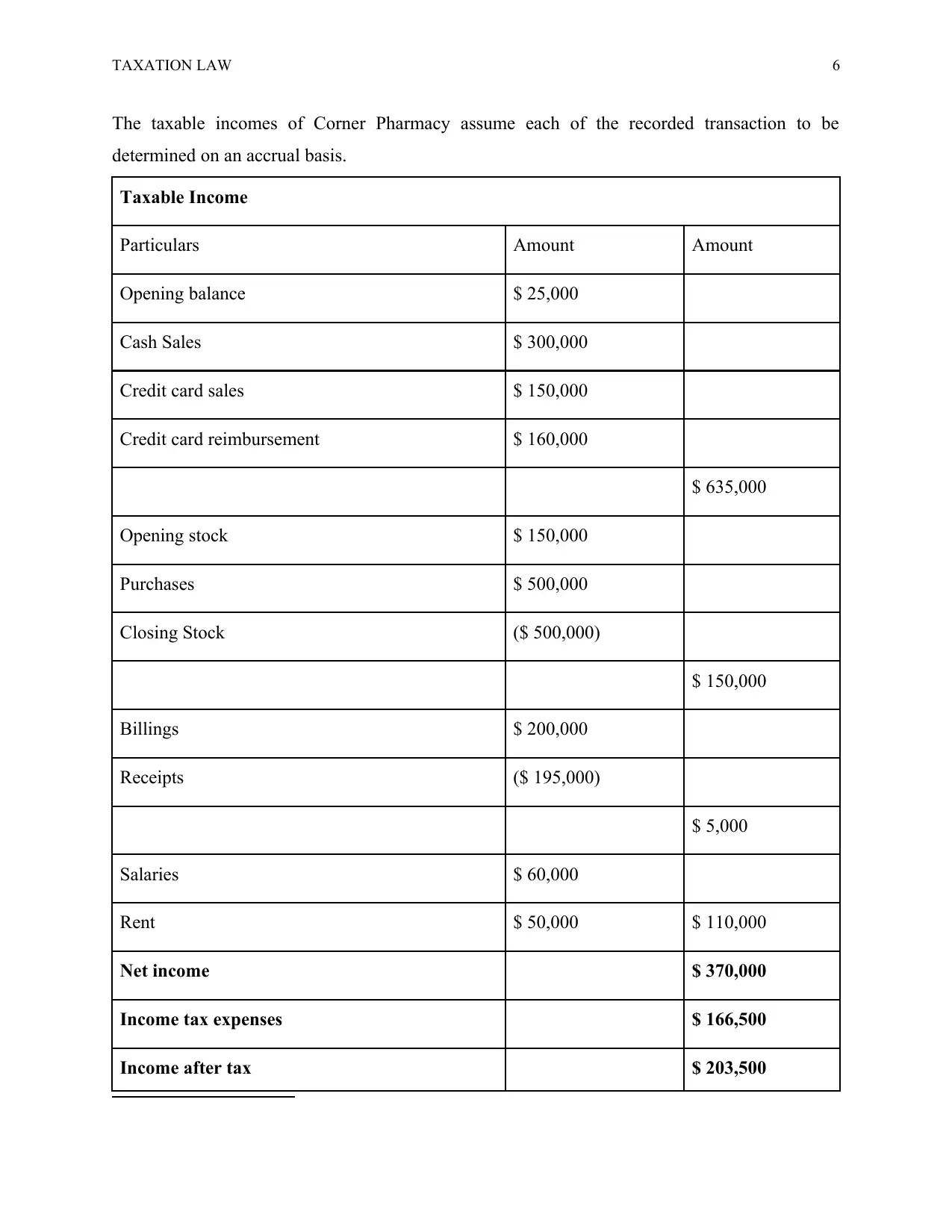
TAXATION LAW 6
The taxable incomes of Corner Pharmacy assume each of the recorded transaction to be
determined on an accrual basis.
Taxable Income
Particulars Amount Amount
Opening balance $ 25,000
Cash Sales $ 300,000
Credit card sales $ 150,000
Credit card reimbursement $ 160,000
$ 635,000
Opening stock $ 150,000
Purchases $ 500,000
Closing Stock ($ 500,000)
$ 150,000
Billings $ 200,000
Receipts ($ 195,000)
$ 5,000
Salaries $ 60,000
Rent $ 50,000 $ 110,000
Net income $ 370,000
Income tax expenses $ 166,500
Income after tax $ 203,500
The taxable incomes of Corner Pharmacy assume each of the recorded transaction to be
determined on an accrual basis.
Taxable Income
Particulars Amount Amount
Opening balance $ 25,000
Cash Sales $ 300,000
Credit card sales $ 150,000
Credit card reimbursement $ 160,000
$ 635,000
Opening stock $ 150,000
Purchases $ 500,000
Closing Stock ($ 500,000)
$ 150,000
Billings $ 200,000
Receipts ($ 195,000)
$ 5,000
Salaries $ 60,000
Rent $ 50,000 $ 110,000
Net income $ 370,000
Income tax expenses $ 166,500
Income after tax $ 203,500
⊘ This is a preview!⊘
Do you want full access?
Subscribe today to unlock all pages.

Trusted by 1+ million students worldwide
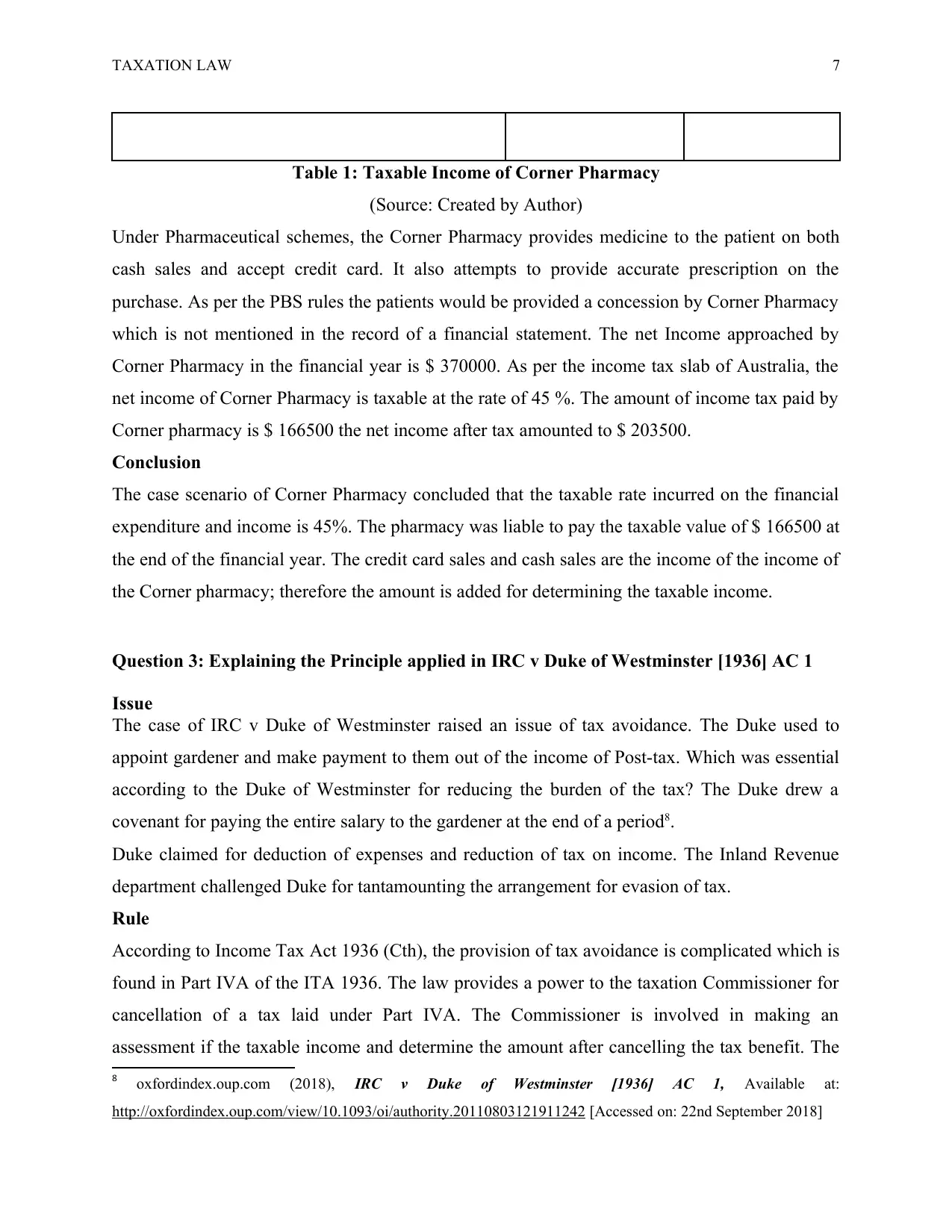
TAXATION LAW 7
Table 1: Taxable Income of Corner Pharmacy
(Source: Created by Author)
Under Pharmaceutical schemes, the Corner Pharmacy provides medicine to the patient on both
cash sales and accept credit card. It also attempts to provide accurate prescription on the
purchase. As per the PBS rules the patients would be provided a concession by Corner Pharmacy
which is not mentioned in the record of a financial statement. The net Income approached by
Corner Pharmacy in the financial year is $ 370000. As per the income tax slab of Australia, the
net income of Corner Pharmacy is taxable at the rate of 45 %. The amount of income tax paid by
Corner pharmacy is $ 166500 the net income after tax amounted to $ 203500.
Conclusion
The case scenario of Corner Pharmacy concluded that the taxable rate incurred on the financial
expenditure and income is 45%. The pharmacy was liable to pay the taxable value of $ 166500 at
the end of the financial year. The credit card sales and cash sales are the income of the income of
the Corner pharmacy; therefore the amount is added for determining the taxable income.
Question 3: Explaining the Principle applied in IRC v Duke of Westminster [1936] AC 1
Issue
The case of IRC v Duke of Westminster raised an issue of tax avoidance. The Duke used to
appoint gardener and make payment to them out of the income of Post-tax. Which was essential
according to the Duke of Westminster for reducing the burden of the tax? The Duke drew a
covenant for paying the entire salary to the gardener at the end of a period8.
Duke claimed for deduction of expenses and reduction of tax on income. The Inland Revenue
department challenged Duke for tantamounting the arrangement for evasion of tax.
Rule
According to Income Tax Act 1936 (Cth), the provision of tax avoidance is complicated which is
found in Part IVA of the ITA 1936. The law provides a power to the taxation Commissioner for
cancellation of a tax laid under Part IVA. The Commissioner is involved in making an
assessment if the taxable income and determine the amount after cancelling the tax benefit. The
8 oxfordindex.oup.com (2018), IRC v Duke of Westminster [1936] AC 1, Available at:
http://oxfordindex.oup.com/view/10.1093/oi/authority.20110803121911242 [Accessed on: 22nd September 2018]
Table 1: Taxable Income of Corner Pharmacy
(Source: Created by Author)
Under Pharmaceutical schemes, the Corner Pharmacy provides medicine to the patient on both
cash sales and accept credit card. It also attempts to provide accurate prescription on the
purchase. As per the PBS rules the patients would be provided a concession by Corner Pharmacy
which is not mentioned in the record of a financial statement. The net Income approached by
Corner Pharmacy in the financial year is $ 370000. As per the income tax slab of Australia, the
net income of Corner Pharmacy is taxable at the rate of 45 %. The amount of income tax paid by
Corner pharmacy is $ 166500 the net income after tax amounted to $ 203500.
Conclusion
The case scenario of Corner Pharmacy concluded that the taxable rate incurred on the financial
expenditure and income is 45%. The pharmacy was liable to pay the taxable value of $ 166500 at
the end of the financial year. The credit card sales and cash sales are the income of the income of
the Corner pharmacy; therefore the amount is added for determining the taxable income.
Question 3: Explaining the Principle applied in IRC v Duke of Westminster [1936] AC 1
Issue
The case of IRC v Duke of Westminster raised an issue of tax avoidance. The Duke used to
appoint gardener and make payment to them out of the income of Post-tax. Which was essential
according to the Duke of Westminster for reducing the burden of the tax? The Duke drew a
covenant for paying the entire salary to the gardener at the end of a period8.
Duke claimed for deduction of expenses and reduction of tax on income. The Inland Revenue
department challenged Duke for tantamounting the arrangement for evasion of tax.
Rule
According to Income Tax Act 1936 (Cth), the provision of tax avoidance is complicated which is
found in Part IVA of the ITA 1936. The law provides a power to the taxation Commissioner for
cancellation of a tax laid under Part IVA. The Commissioner is involved in making an
assessment if the taxable income and determine the amount after cancelling the tax benefit. The
8 oxfordindex.oup.com (2018), IRC v Duke of Westminster [1936] AC 1, Available at:
http://oxfordindex.oup.com/view/10.1093/oi/authority.20110803121911242 [Accessed on: 22nd September 2018]
Paraphrase This Document
Need a fresh take? Get an instant paraphrase of this document with our AI Paraphraser
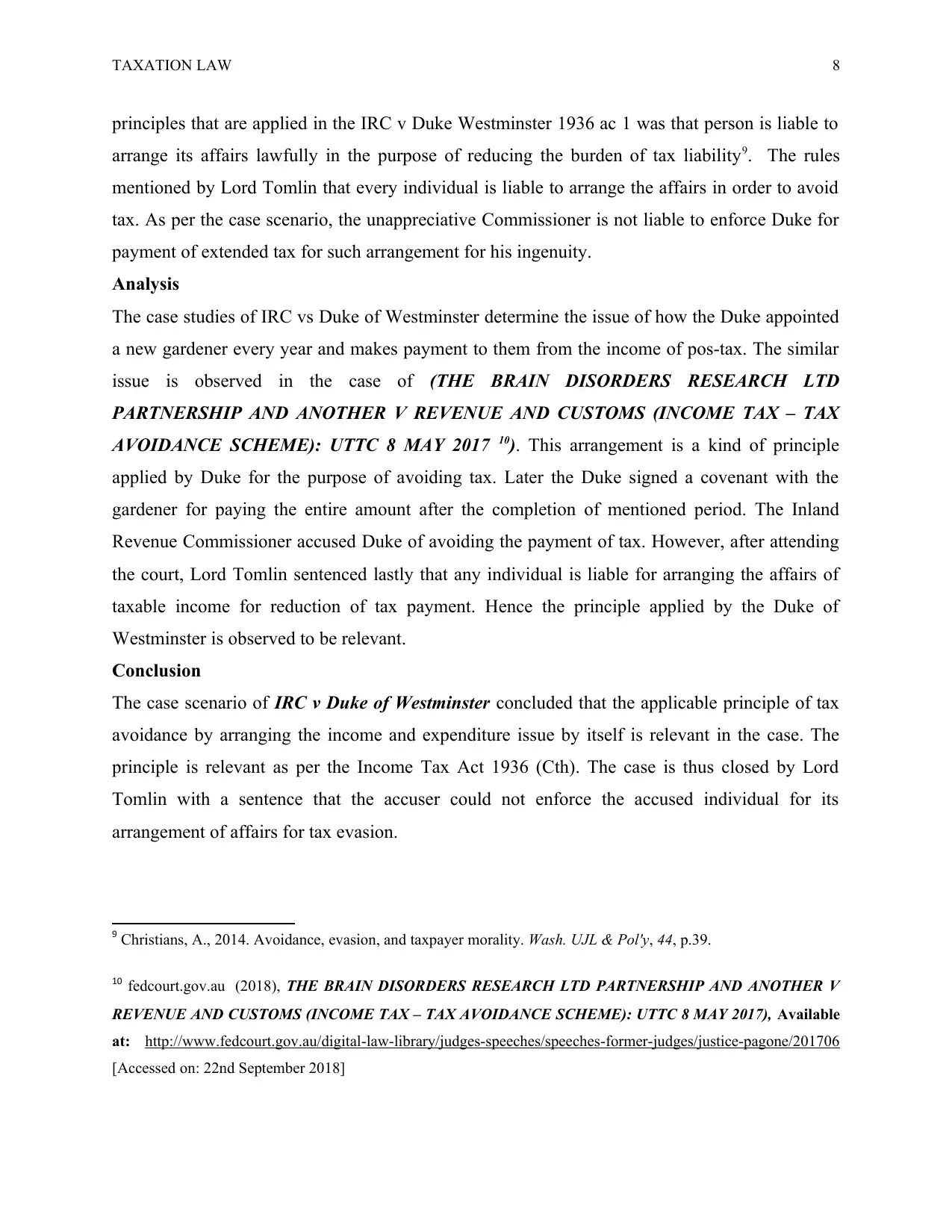
TAXATION LAW 8
principles that are applied in the IRC v Duke Westminster 1936 ac 1 was that person is liable to
arrange its affairs lawfully in the purpose of reducing the burden of tax liability9. The rules
mentioned by Lord Tomlin that every individual is liable to arrange the affairs in order to avoid
tax. As per the case scenario, the unappreciative Commissioner is not liable to enforce Duke for
payment of extended tax for such arrangement for his ingenuity.
Analysis
The case studies of IRC vs Duke of Westminster determine the issue of how the Duke appointed
a new gardener every year and makes payment to them from the income of pos-tax. The similar
issue is observed in the case of (THE BRAIN DISORDERS RESEARCH LTD
PARTNERSHIP AND ANOTHER V REVENUE AND CUSTOMS (INCOME TAX – TAX
AVOIDANCE SCHEME): UTTC 8 MAY 2017 10). This arrangement is a kind of principle
applied by Duke for the purpose of avoiding tax. Later the Duke signed a covenant with the
gardener for paying the entire amount after the completion of mentioned period. The Inland
Revenue Commissioner accused Duke of avoiding the payment of tax. However, after attending
the court, Lord Tomlin sentenced lastly that any individual is liable for arranging the affairs of
taxable income for reduction of tax payment. Hence the principle applied by the Duke of
Westminster is observed to be relevant.
Conclusion
The case scenario of IRC v Duke of Westminster concluded that the applicable principle of tax
avoidance by arranging the income and expenditure issue by itself is relevant in the case. The
principle is relevant as per the Income Tax Act 1936 (Cth). The case is thus closed by Lord
Tomlin with a sentence that the accuser could not enforce the accused individual for its
arrangement of affairs for tax evasion.
9 Christians, A., 2014. Avoidance, evasion, and taxpayer morality. Wash. UJL & Pol'y, 44, p.39.
10 fedcourt.gov.au (2018), THE BRAIN DISORDERS RESEARCH LTD PARTNERSHIP AND ANOTHER V
REVENUE AND CUSTOMS (INCOME TAX – TAX AVOIDANCE SCHEME): UTTC 8 MAY 2017), Available
at: http://www.fedcourt.gov.au/digital-law-library/judges-speeches/speeches-former-judges/justice-pagone/201706
[Accessed on: 22nd September 2018]
principles that are applied in the IRC v Duke Westminster 1936 ac 1 was that person is liable to
arrange its affairs lawfully in the purpose of reducing the burden of tax liability9. The rules
mentioned by Lord Tomlin that every individual is liable to arrange the affairs in order to avoid
tax. As per the case scenario, the unappreciative Commissioner is not liable to enforce Duke for
payment of extended tax for such arrangement for his ingenuity.
Analysis
The case studies of IRC vs Duke of Westminster determine the issue of how the Duke appointed
a new gardener every year and makes payment to them from the income of pos-tax. The similar
issue is observed in the case of (THE BRAIN DISORDERS RESEARCH LTD
PARTNERSHIP AND ANOTHER V REVENUE AND CUSTOMS (INCOME TAX – TAX
AVOIDANCE SCHEME): UTTC 8 MAY 2017 10). This arrangement is a kind of principle
applied by Duke for the purpose of avoiding tax. Later the Duke signed a covenant with the
gardener for paying the entire amount after the completion of mentioned period. The Inland
Revenue Commissioner accused Duke of avoiding the payment of tax. However, after attending
the court, Lord Tomlin sentenced lastly that any individual is liable for arranging the affairs of
taxable income for reduction of tax payment. Hence the principle applied by the Duke of
Westminster is observed to be relevant.
Conclusion
The case scenario of IRC v Duke of Westminster concluded that the applicable principle of tax
avoidance by arranging the income and expenditure issue by itself is relevant in the case. The
principle is relevant as per the Income Tax Act 1936 (Cth). The case is thus closed by Lord
Tomlin with a sentence that the accuser could not enforce the accused individual for its
arrangement of affairs for tax evasion.
9 Christians, A., 2014. Avoidance, evasion, and taxpayer morality. Wash. UJL & Pol'y, 44, p.39.
10 fedcourt.gov.au (2018), THE BRAIN DISORDERS RESEARCH LTD PARTNERSHIP AND ANOTHER V
REVENUE AND CUSTOMS (INCOME TAX – TAX AVOIDANCE SCHEME): UTTC 8 MAY 2017), Available
at: http://www.fedcourt.gov.au/digital-law-library/judges-speeches/speeches-former-judges/justice-pagone/201706
[Accessed on: 22nd September 2018]
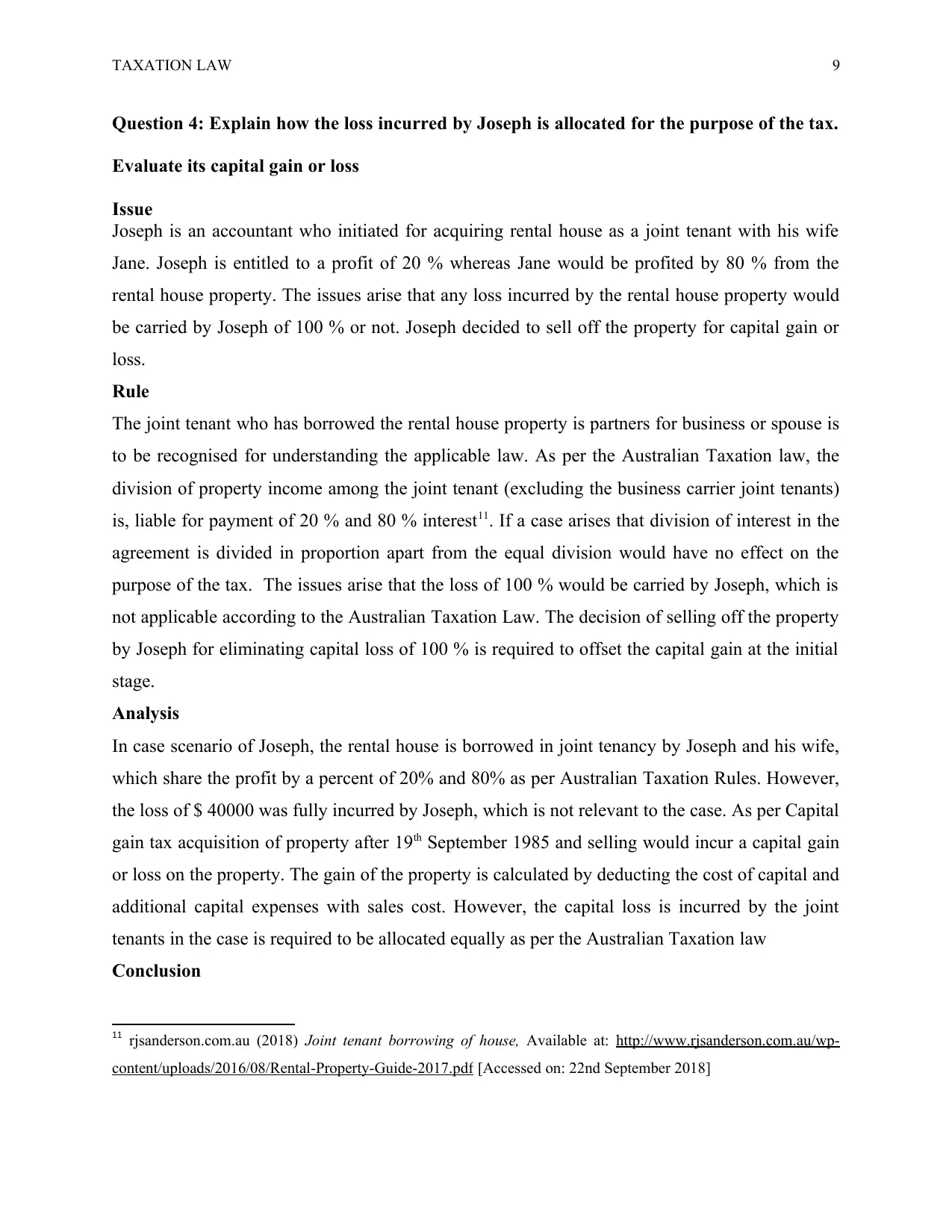
TAXATION LAW 9
Question 4: Explain how the loss incurred by Joseph is allocated for the purpose of the tax.
Evaluate its capital gain or loss
Issue
Joseph is an accountant who initiated for acquiring rental house as a joint tenant with his wife
Jane. Joseph is entitled to a profit of 20 % whereas Jane would be profited by 80 % from the
rental house property. The issues arise that any loss incurred by the rental house property would
be carried by Joseph of 100 % or not. Joseph decided to sell off the property for capital gain or
loss.
Rule
The joint tenant who has borrowed the rental house property is partners for business or spouse is
to be recognised for understanding the applicable law. As per the Australian Taxation law, the
division of property income among the joint tenant (excluding the business carrier joint tenants)
is, liable for payment of 20 % and 80 % interest11. If a case arises that division of interest in the
agreement is divided in proportion apart from the equal division would have no effect on the
purpose of the tax. The issues arise that the loss of 100 % would be carried by Joseph, which is
not applicable according to the Australian Taxation Law. The decision of selling off the property
by Joseph for eliminating capital loss of 100 % is required to offset the capital gain at the initial
stage.
Analysis
In case scenario of Joseph, the rental house is borrowed in joint tenancy by Joseph and his wife,
which share the profit by a percent of 20% and 80% as per Australian Taxation Rules. However,
the loss of $ 40000 was fully incurred by Joseph, which is not relevant to the case. As per Capital
gain tax acquisition of property after 19th September 1985 and selling would incur a capital gain
or loss on the property. The gain of the property is calculated by deducting the cost of capital and
additional capital expenses with sales cost. However, the capital loss is incurred by the joint
tenants in the case is required to be allocated equally as per the Australian Taxation law
Conclusion
11 rjsanderson.com.au (2018) Joint tenant borrowing of house, Available at: http://www.rjsanderson.com.au/wp-
content/uploads/2016/08/Rental-Property-Guide-2017.pdf [Accessed on: 22nd September 2018]
Question 4: Explain how the loss incurred by Joseph is allocated for the purpose of the tax.
Evaluate its capital gain or loss
Issue
Joseph is an accountant who initiated for acquiring rental house as a joint tenant with his wife
Jane. Joseph is entitled to a profit of 20 % whereas Jane would be profited by 80 % from the
rental house property. The issues arise that any loss incurred by the rental house property would
be carried by Joseph of 100 % or not. Joseph decided to sell off the property for capital gain or
loss.
Rule
The joint tenant who has borrowed the rental house property is partners for business or spouse is
to be recognised for understanding the applicable law. As per the Australian Taxation law, the
division of property income among the joint tenant (excluding the business carrier joint tenants)
is, liable for payment of 20 % and 80 % interest11. If a case arises that division of interest in the
agreement is divided in proportion apart from the equal division would have no effect on the
purpose of the tax. The issues arise that the loss of 100 % would be carried by Joseph, which is
not applicable according to the Australian Taxation Law. The decision of selling off the property
by Joseph for eliminating capital loss of 100 % is required to offset the capital gain at the initial
stage.
Analysis
In case scenario of Joseph, the rental house is borrowed in joint tenancy by Joseph and his wife,
which share the profit by a percent of 20% and 80% as per Australian Taxation Rules. However,
the loss of $ 40000 was fully incurred by Joseph, which is not relevant to the case. As per Capital
gain tax acquisition of property after 19th September 1985 and selling would incur a capital gain
or loss on the property. The gain of the property is calculated by deducting the cost of capital and
additional capital expenses with sales cost. However, the capital loss is incurred by the joint
tenants in the case is required to be allocated equally as per the Australian Taxation law
Conclusion
11 rjsanderson.com.au (2018) Joint tenant borrowing of house, Available at: http://www.rjsanderson.com.au/wp-
content/uploads/2016/08/Rental-Property-Guide-2017.pdf [Accessed on: 22nd September 2018]
⊘ This is a preview!⊘
Do you want full access?
Subscribe today to unlock all pages.

Trusted by 1+ million students worldwide
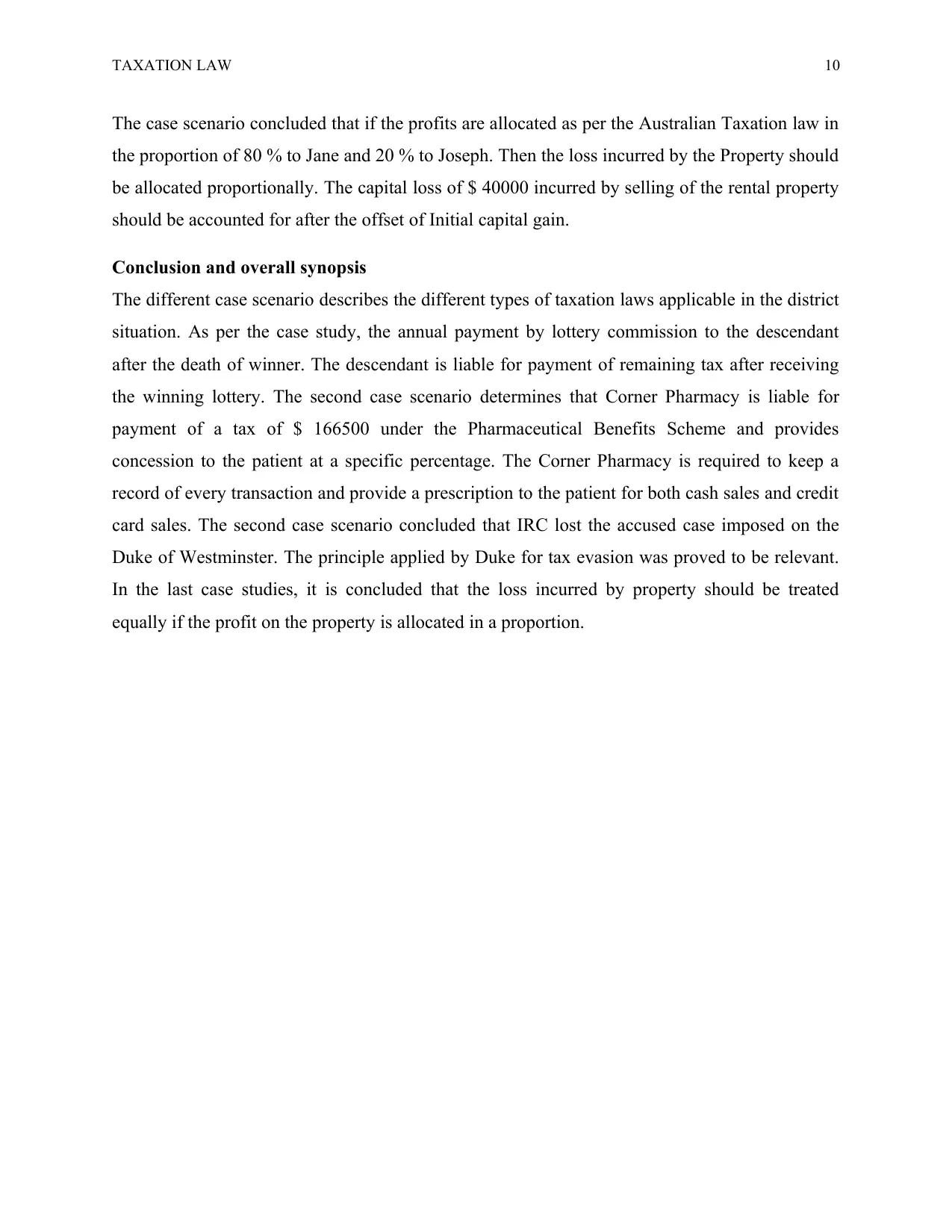
TAXATION LAW 10
The case scenario concluded that if the profits are allocated as per the Australian Taxation law in
the proportion of 80 % to Jane and 20 % to Joseph. Then the loss incurred by the Property should
be allocated proportionally. The capital loss of $ 40000 incurred by selling of the rental property
should be accounted for after the offset of Initial capital gain.
Conclusion and overall synopsis
The different case scenario describes the different types of taxation laws applicable in the district
situation. As per the case study, the annual payment by lottery commission to the descendant
after the death of winner. The descendant is liable for payment of remaining tax after receiving
the winning lottery. The second case scenario determines that Corner Pharmacy is liable for
payment of a tax of $ 166500 under the Pharmaceutical Benefits Scheme and provides
concession to the patient at a specific percentage. The Corner Pharmacy is required to keep a
record of every transaction and provide a prescription to the patient for both cash sales and credit
card sales. The second case scenario concluded that IRC lost the accused case imposed on the
Duke of Westminster. The principle applied by Duke for tax evasion was proved to be relevant.
In the last case studies, it is concluded that the loss incurred by property should be treated
equally if the profit on the property is allocated in a proportion.
The case scenario concluded that if the profits are allocated as per the Australian Taxation law in
the proportion of 80 % to Jane and 20 % to Joseph. Then the loss incurred by the Property should
be allocated proportionally. The capital loss of $ 40000 incurred by selling of the rental property
should be accounted for after the offset of Initial capital gain.
Conclusion and overall synopsis
The different case scenario describes the different types of taxation laws applicable in the district
situation. As per the case study, the annual payment by lottery commission to the descendant
after the death of winner. The descendant is liable for payment of remaining tax after receiving
the winning lottery. The second case scenario determines that Corner Pharmacy is liable for
payment of a tax of $ 166500 under the Pharmaceutical Benefits Scheme and provides
concession to the patient at a specific percentage. The Corner Pharmacy is required to keep a
record of every transaction and provide a prescription to the patient for both cash sales and credit
card sales. The second case scenario concluded that IRC lost the accused case imposed on the
Duke of Westminster. The principle applied by Duke for tax evasion was proved to be relevant.
In the last case studies, it is concluded that the loss incurred by property should be treated
equally if the profit on the property is allocated in a proportion.
Paraphrase This Document
Need a fresh take? Get an instant paraphrase of this document with our AI Paraphraser
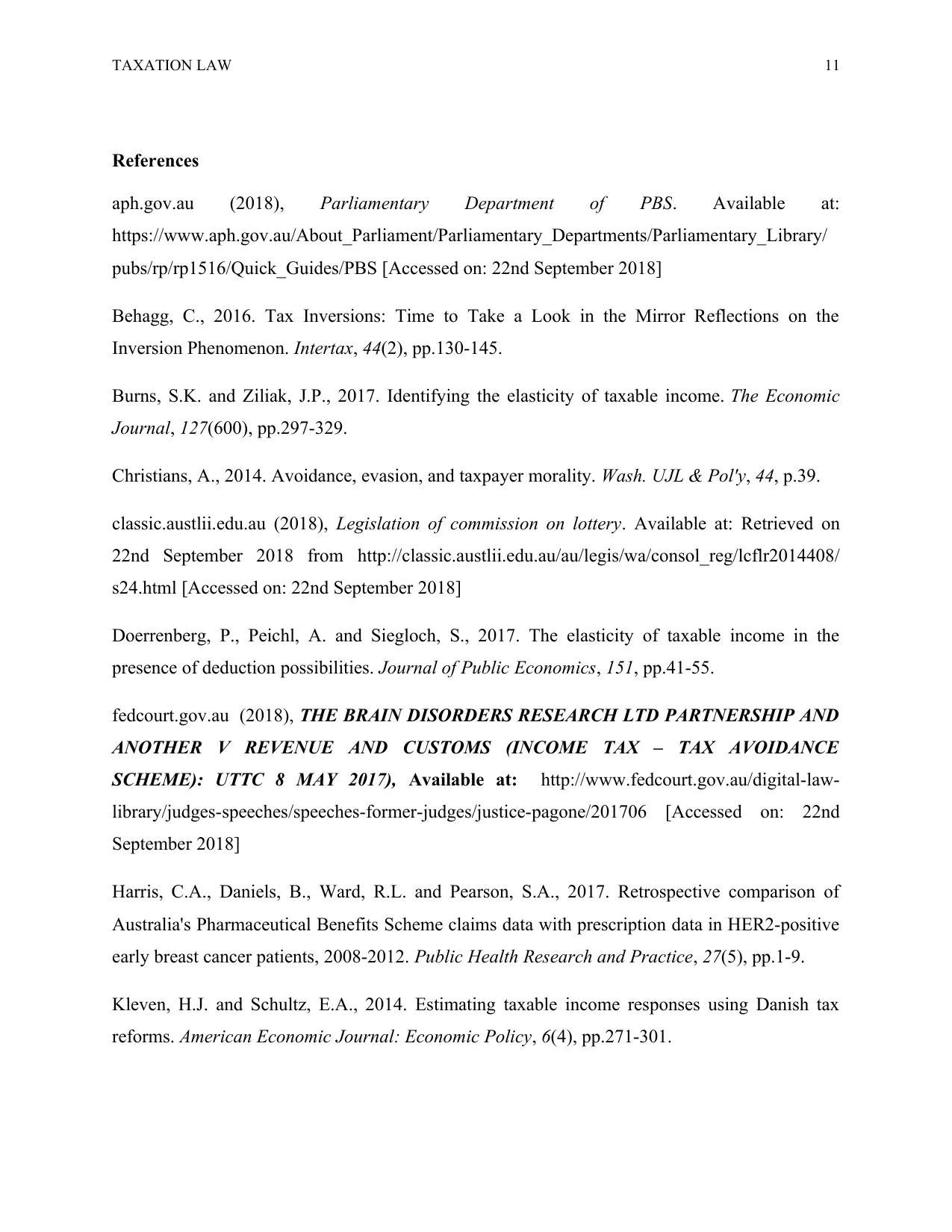
TAXATION LAW 11
References
aph.gov.au (2018), Parliamentary Department of PBS. Available at:
https://www.aph.gov.au/About_Parliament/Parliamentary_Departments/Parliamentary_Library/
pubs/rp/rp1516/Quick_Guides/PBS [Accessed on: 22nd September 2018]
Behagg, C., 2016. Tax Inversions: Time to Take a Look in the Mirror Reflections on the
Inversion Phenomenon. Intertax, 44(2), pp.130-145.
Burns, S.K. and Ziliak, J.P., 2017. Identifying the elasticity of taxable income. The Economic
Journal, 127(600), pp.297-329.
Christians, A., 2014. Avoidance, evasion, and taxpayer morality. Wash. UJL & Pol'y, 44, p.39.
classic.austlii.edu.au (2018), Legislation of commission on lottery. Available at: Retrieved on
22nd September 2018 from http://classic.austlii.edu.au/au/legis/wa/consol_reg/lcflr2014408/
s24.html [Accessed on: 22nd September 2018]
Doerrenberg, P., Peichl, A. and Siegloch, S., 2017. The elasticity of taxable income in the
presence of deduction possibilities. Journal of Public Economics, 151, pp.41-55.
fedcourt.gov.au (2018), THE BRAIN DISORDERS RESEARCH LTD PARTNERSHIP AND
ANOTHER V REVENUE AND CUSTOMS (INCOME TAX – TAX AVOIDANCE
SCHEME): UTTC 8 MAY 2017), Available at: http://www.fedcourt.gov.au/digital-law-
library/judges-speeches/speeches-former-judges/justice-pagone/201706 [Accessed on: 22nd
September 2018]
Harris, C.A., Daniels, B., Ward, R.L. and Pearson, S.A., 2017. Retrospective comparison of
Australia's Pharmaceutical Benefits Scheme claims data with prescription data in HER2-positive
early breast cancer patients, 2008-2012. Public Health Research and Practice, 27(5), pp.1-9.
Kleven, H.J. and Schultz, E.A., 2014. Estimating taxable income responses using Danish tax
reforms. American Economic Journal: Economic Policy, 6(4), pp.271-301.
References
aph.gov.au (2018), Parliamentary Department of PBS. Available at:
https://www.aph.gov.au/About_Parliament/Parliamentary_Departments/Parliamentary_Library/
pubs/rp/rp1516/Quick_Guides/PBS [Accessed on: 22nd September 2018]
Behagg, C., 2016. Tax Inversions: Time to Take a Look in the Mirror Reflections on the
Inversion Phenomenon. Intertax, 44(2), pp.130-145.
Burns, S.K. and Ziliak, J.P., 2017. Identifying the elasticity of taxable income. The Economic
Journal, 127(600), pp.297-329.
Christians, A., 2014. Avoidance, evasion, and taxpayer morality. Wash. UJL & Pol'y, 44, p.39.
classic.austlii.edu.au (2018), Legislation of commission on lottery. Available at: Retrieved on
22nd September 2018 from http://classic.austlii.edu.au/au/legis/wa/consol_reg/lcflr2014408/
s24.html [Accessed on: 22nd September 2018]
Doerrenberg, P., Peichl, A. and Siegloch, S., 2017. The elasticity of taxable income in the
presence of deduction possibilities. Journal of Public Economics, 151, pp.41-55.
fedcourt.gov.au (2018), THE BRAIN DISORDERS RESEARCH LTD PARTNERSHIP AND
ANOTHER V REVENUE AND CUSTOMS (INCOME TAX – TAX AVOIDANCE
SCHEME): UTTC 8 MAY 2017), Available at: http://www.fedcourt.gov.au/digital-law-
library/judges-speeches/speeches-former-judges/justice-pagone/201706 [Accessed on: 22nd
September 2018]
Harris, C.A., Daniels, B., Ward, R.L. and Pearson, S.A., 2017. Retrospective comparison of
Australia's Pharmaceutical Benefits Scheme claims data with prescription data in HER2-positive
early breast cancer patients, 2008-2012. Public Health Research and Practice, 27(5), pp.1-9.
Kleven, H.J. and Schultz, E.A., 2014. Estimating taxable income responses using Danish tax
reforms. American Economic Journal: Economic Policy, 6(4), pp.271-301.
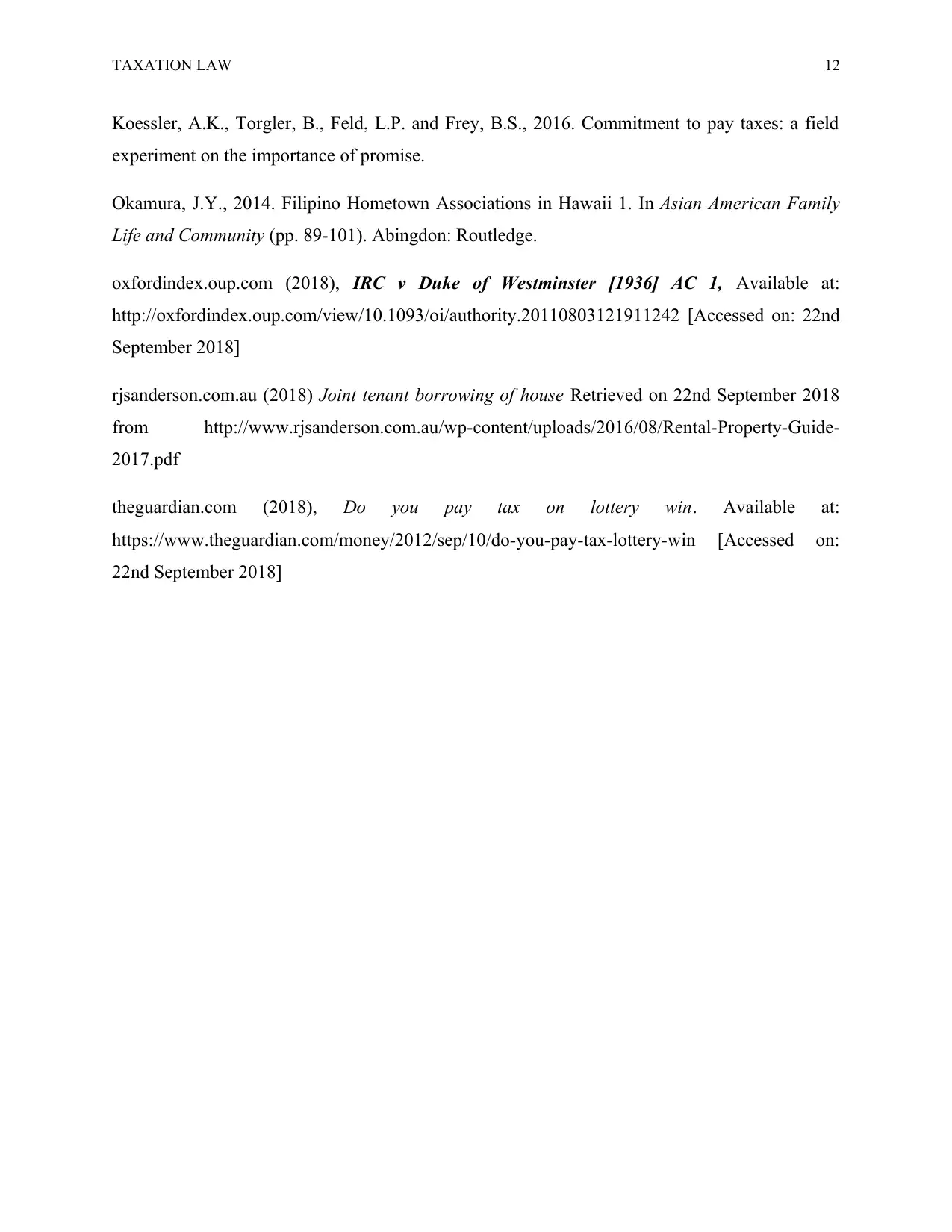
TAXATION LAW 12
Koessler, A.K., Torgler, B., Feld, L.P. and Frey, B.S., 2016. Commitment to pay taxes: a field
experiment on the importance of promise.
Okamura, J.Y., 2014. Filipino Hometown Associations in Hawaii 1. In Asian American Family
Life and Community (pp. 89-101). Abingdon: Routledge.
oxfordindex.oup.com (2018), IRC v Duke of Westminster [1936] AC 1, Available at:
http://oxfordindex.oup.com/view/10.1093/oi/authority.20110803121911242 [Accessed on: 22nd
September 2018]
rjsanderson.com.au (2018) Joint tenant borrowing of house Retrieved on 22nd September 2018
from http://www.rjsanderson.com.au/wp-content/uploads/2016/08/Rental-Property-Guide-
2017.pdf
theguardian.com (2018), Do you pay tax on lottery win. Available at:
https://www.theguardian.com/money/2012/sep/10/do-you-pay-tax-lottery-win [Accessed on:
22nd September 2018]
Koessler, A.K., Torgler, B., Feld, L.P. and Frey, B.S., 2016. Commitment to pay taxes: a field
experiment on the importance of promise.
Okamura, J.Y., 2014. Filipino Hometown Associations in Hawaii 1. In Asian American Family
Life and Community (pp. 89-101). Abingdon: Routledge.
oxfordindex.oup.com (2018), IRC v Duke of Westminster [1936] AC 1, Available at:
http://oxfordindex.oup.com/view/10.1093/oi/authority.20110803121911242 [Accessed on: 22nd
September 2018]
rjsanderson.com.au (2018) Joint tenant borrowing of house Retrieved on 22nd September 2018
from http://www.rjsanderson.com.au/wp-content/uploads/2016/08/Rental-Property-Guide-
2017.pdf
theguardian.com (2018), Do you pay tax on lottery win. Available at:
https://www.theguardian.com/money/2012/sep/10/do-you-pay-tax-lottery-win [Accessed on:
22nd September 2018]
⊘ This is a preview!⊘
Do you want full access?
Subscribe today to unlock all pages.

Trusted by 1+ million students worldwide
1 out of 12
Related Documents
Your All-in-One AI-Powered Toolkit for Academic Success.
+13062052269
info@desklib.com
Available 24*7 on WhatsApp / Email
![[object Object]](/_next/static/media/star-bottom.7253800d.svg)
Unlock your academic potential
Copyright © 2020–2026 A2Z Services. All Rights Reserved. Developed and managed by ZUCOL.





